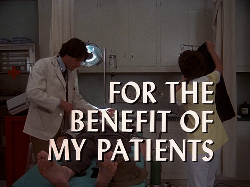For the Benefit of My Patients (Quincy, M.E.)
| For the Benefit of My Patients | ||||||||||||||||||||||||||||||||||||||
|---|---|---|---|---|---|---|---|---|---|---|---|---|---|---|---|---|---|---|---|---|---|---|---|---|---|---|---|---|---|---|---|---|---|---|---|---|---|---|

| ||||||||||||||||||||||||||||||||||||||
|
Episode Quote
"A duty to heal doesn’t include a license to harm—and it sure as hell doesn’t excuse concealment." ~ Dr. Quincy, in For the Benefit of My Patients (Quincy, M.E.)
Episode Overview
For the Benefit of My Patients is the 21st episode of season 5 of Quincy, M.E., aired on NBC on April 10, 1980. Quincy investigates malpractice at a hospital after several patients die under suspicious circumstances, focusing on sedatives and narcotics allegedly administered "for their benefit".
Table of Contents
Application of The QME Episode Laws
✅ **Law 1 – Truth & Justice:** Quincy uncovers that several unexplained patient deaths were caused by overmedication, not natural causes. ✅ **Law 2 – Social/Ethical Issues:** Raises questions around medical ethics, elder care, and the "benefit" rhetoric used to justify improper treatment. ✅ **Law 3 – Sensitive Topics:** Tackles patient vulnerability and institutional opacity with compassion and rigour. ✅ **Law 4 – Scientific Accuracy:** Detailed pharmacological analyses and autopsies highlight combined sedative effects and drug interaction - central to Quincy’s expose.
Episode Synopsis
Following reports of a whistleblowing nurse (Nurse Marley) and several unexplained deaths, Quincy investigates. His autopsies reveal unusually high sedative concentrations and risky drug combinations. Pharmacy logs show alarming trends. When Quincy interviews Dr. Keenan (the attending physician), he claims the dosages were “for patient comfort”. Quincy suspects negligence or worse and demands a full review. As the hospital resists, Quincy’s forensic proof initiates an internal investigation—saving future lives through exposure.
Plot Summary
1. Nurse Marley delivers confidential documents indicating repeated sedative use. 2. Autopsy reveals levels far above standard—and mixed medications suspected of fatal synergy. 3. Quincy and Sam cross-reference patient charts and pharmacy logs. 4. Quincy confronts Dr. Keenan, who defends his actions under “palliative care”. 5. With mounting evidence, Quincy exposes the pattern, challenging hospital ethics. 6. The hospital board responds: investigations begin, policy reforms initiated, and legal responsibility addressed.
Main Cast
- **Jack Klugman** as Dr. R. Quincy
- **Robert Ito** as Sam Fujiyama
- **Garry Walberg** as Lt. Frank Monahan
- **John S. Ragin** as Dr. Robert Asten
- **Val Bisoglio** as Danny Tovo
- **Joseph Roman** as Sgt. Brill
Guest Cast
- **Robert English** as Dr. Paul Keenan
- **Sharon Farrell** as Nurse Marley
Case File Summary
Victims: Multiple elderly or terminal patients Case #: LACC S5E21
Cause of death linked to prescription overdoses and wrongful combinations of sedatives and narcotics under the guise of medical necessity.
Additional Victims
- Several non-fatal cases showing signs of deliberate overmedication; some patients experienced prolonged sedation or respiratory suppression.
Alleged Perpetrators
- Dr. Paul Keenan – defended his actions as "compassionate" but crossed ethical lines
- Hospital pharmacy staff – unresolved liability regarding dispensing practices
Filming Locations
Interior hospital sets at Universal studios; exterior shots at an LA-area healthcare facility.
Forensic Science Insight
- Autopsy revealed sedative blood levels 3–5× recommended dose.
- Toxicology labs traced suspicious drug interactions.
- Quincy reconstructed prescribing patterns to show a non-random overdose trend.
- Medical ethics testimony spotlighted boundary between therapy and harm.
Themes & Tropes
- **"Compassionate Homicide"** – overmedication framed as care
- **Institutional Denial** – hospital tries to minimize findings
- **Forensic Justice** – science calls malpractice to account
- **Whistleblower Courage** – nurse Marley risks career to expose misconduct
Reception & Legacy
Praised for spotlighting gray areas in medical care, this episode resonated with emerging public concern about elder care and end-of-life ethics. Audience reception rated it highly among season 5 storylines.
Trivia
- Inspired by real 1970s-Early ’80s controversies around hospice and overmedication debates.
- Sharon Farrell’s portrayal of a brave nurse highlighted whistleblower struggles.
Cultural Impact
For the Benefit of My Patients contributed to public discourse on patient rights, medical transparency, and proper sedative use in televised drama. The case influenced how later medical shows addressed end-of-life care and ethics.
